24 downloads
Title of document: Conference Proceedings The 6th Biennial ECHO Asia Agriculture and Community Development Conference - ECHO Asia Notes - Issue 34 Authors: Ministry/Government Agency/Organisation: Echo Asia Year of publication: 2017 Geographic focus: Cambodia, Laos, Myanmar, India Summary: The proceedings of the 6th Biennial ECHO Asia Agriculture and Community Development Conference that took place in Chiang Mai in October 2017 includes several articles about sustainable farming and agroecological practices in Asia: 1. Edible Wild Plants and their Contribution to Livelihoods and Diet of Ethnic Communities in Northeastern Cambodia, Ra Thorng (Mekong Institute) 2. Enabling a Bottom-up Approach in a Top-down Environment: A Case Study on Participatory Guarantee System (PGS) Facilitation in Huaphanh Province, Lao PDR, Claire Georges and Pierre Ferrand (GRET) 3. Facilitating Farmer-led Innovation and Extension in Agroecology in the Ayeyarwaddy Delta, Myanmar, Justine Scholle, Premila Masse, and Louis Pautrizel (GRET) 4. Improving Lives and Livelihoods through Responsible Rural Tourism, with Examples from India, Keith Virgo, Manisha Pande, Pooja Masoor, and Dinesh Pande (Village Ways Pvt Ltd) 5. Sustainable Intensification of Rain Fed Lowland Rice Systems: A Case Study in Xieng Khouang, Province in Lao PDR, Mathilde Bourjac, Pierre Ferrand (GRET) and Jean-Christophe Castella (CIRAD) Read More
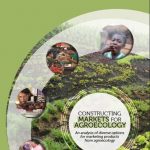
52 downloads
Title of document: Constructing markets for agroecology “An analysis of diverse options for marketing products from agroecology” Authors: Allison Loconto, Alejandra Jimenez and Emilie Vandecandelaere Journal’s name if any: Ministry/Government Agency/Organisation: FAO, INRA Year of publication: 2017 Geographic focus: Global level Main issues / topics addressed (for example: Introduction; Markets for agroecology; Agroecological markets; Conclusions and Recommendations……) School of agroecology (if any): Web address to original document (if any): https://www.researchgate.net/publication/320193869_What_might_an_agro-ecological_food_system_look_like https://www.researchgate.net/profile/Allison_Loconto/publication/320193869_What_might_an_agro-ecological_food_system_look_like/links/5a419323458515f6b04cf0c6/What-might-an-agro-ecological-food-system-look-like.pdf Summary: The purpose of this study is to explore whether and how products from agroecological production systems are being valued in markets. This exploratory study has been conducted using a conceptual framework from economic sociology. It produced qualitative and descriptive evidence from the perspective of producers, consumers and intermediaries working within specific initiatives. These initiatives are created to ensure that food from agroecological production is exchanged and traded between producers and consumers. They also illustrate how the organization of networks and the creation of “value” form markets for agroecology. The study is based on a meta-analysis of 12 case studies, mainly from developing and emerging countries and one developed country (Benin, the Plurinational State of Bolivia, Brazil, Chile, China, Colombia, Ecuador, France, Kazakhstan, Mozambique, Namibia, Uganda), with the collection of small samples of empirical data. Based on a meta-analysis of 12 case studies from different ongoing initiatives around the world, we focus on how different types of local actors (producers, consumers and intermediaries) create markets for agroecological products. The results show that markets for agroecological products do exist, but are not always separate from organic markets. Read More
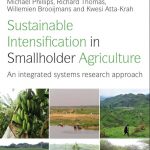
15 downloads
Title of document: Sustainable Intensification in Smallholder Agriculture “An integrated systems research approach” Authors: Ingrid Öborn, Bernard Vanlauwe, Michael Phillips, Richard Thomas, Willemien Brooijmans and Kwesi Atta-Krah Journal’s name if any: Ministry/Government Agency/Organisation: Routledge Year of publication: 2017 Geographic focus: Global level Main issues / topics addressed (for example: Conceptual underpinning of system research; sustainable intensification in practice; integrating nutrition, gender and equity in research for improved livelihood; Systems and institutional innovation……) School of agroecology (if any): Web address to original document (if any): https://www.routledge.com/Sustainable-Intensification-in-Smallholder-Agriculture-An-integrated-systems/Oborn-Vanlauwe-Phillips-Thomas-Brooijmans-Atta-Krah/p/book/9781138668089 Summary: Sustainable intensification has recently been developed and adopted as a key concept and driver for research and policy in sustainable agriculture. It includes ecological, economic and social dimensions, where food and nutrition security, gender and equity are crucial components. This book describes different aspects of systems research in agriculture in its broadest sense, where the focus is moved from farming systems to livelihoods systems and institutional innovation. Much of the work represents outputs of the three CGIAR Research Programs on Integrated Systems for the Humid Tropics, Aquatic Agricultural Systems and Dryland Systems. The chapters are based around four themes: the conceptual underpinnings of systems research; sustainable intensification in practice; integrating nutrition, gender and equity in research for improved livelihoods; and systems and institutional innovation. While most of the case studies are from countries and agro-ecological zones in Africa, there are also some from Latin America, Southeast Asia and the Pacific. Read More
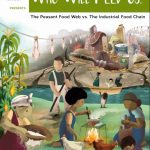
15 downloads
Title of document: Who Will Feed Us? The Industrial Food Chain vs. the Peasant Food Web Authors: ETC Group Journal’s name if any: Ministry/Government Agency/Organisation: ETC Group Year of publication: 2017 Geographic focus: Global level Main issues / topics addressed (for example: 24 questions about our food system……) School of agroecology (if any): Web address to original document (if any): http://www.etcgroup.org/files/files/etc-whowillfeedus-english-webshare.pdf Summary: ETC Group is a non-profit international civil society organization registered in the USA, Canada and the Philippines. ETC Group’s booklet builds on the 2009 and 2013 editions, updating our research contrasting the Peasant Food Web and the Industrial Food Chain. Who Will Feed Us, now in its third edition, compares the industrial food system with peasant farming. By using 24 questions about our food system Read More

41 downloads
Title of document: Agriculture at a Crossroads “IAASTD findings and recommendations for future farming” Authors: Angelika Beck, Benedikt Haerlin and Lea Richter Journal’s name if any: Ministry/Government Agency/Organisation: Agriculture at a Crossroads Year of publication: 2016 Geographic focus: Global level Main issues / topics addressed (for example: hunger and health, meat and animal feed, industrial and small-scale farming, agroecology, climate and energy, soil fertility and land grabbing……) School of agroecology (if any): Web address to original document (if any): https://www.globalagriculture.org/fileadmin/files/weltagrarbericht/EnglishBrochure/BrochureIAASTD_en_web_small.pdf Summary: The International Assessment of Agricultural Knowledge, Science and Technology for Development (IAASTD), commonly known as the World Agriculture Report. More than 400 scientists from all continents and a broad spectrum of disciplines worked together for four years with the aim of answering the following question: “How can we reduce hunger and poverty, improve rural livelihoods and facilitate equitable, environmentally, socially and economically sustainable development through the generation of, access to, and use of agricultural knowledge, science and technology?” The brochure “Agriculture at a Crossroads: IAASTD findings and recommendations for future farming” presents the report’s main findings with updated facts and figures, charts and maps and the latest scientific insights. The brochure’s topics such as hunger and health, meat and animal feed, industrial and small-scale farming, agroecology, climate and energy, soil fertility and land grabbing. Read More
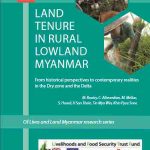
2 downloads
Title of document: Land tenure in rural lowland Myanmar: From historical perspectives to contemporary realities in the Dry zone and the Delta_Myanmar version Authors: M. Boutry, C. Allaverdian, M. Mellac, S. Huard, U San Thein, Tin Myo Win, Khin Pyae Sone Ministry/Government Agency/Organisation: GRET Year of publication: 2017 Geographic focus: Myanmar Summary: During the critical years following the 2012 land reforms undertaken in the midst of Myanmar’s political transition, Gret conducted an in-depth study combining qualitative and quantitative surveys in nine villages of Bogale and Mawlamyinegyun townships (Delta) and nine villages in Monywa and Yinmabin townships (Dry Zone). The full report and the synthesis are the result of more than two years in-depth research and 13 months of fieldwork that involved an inter-disciplinary team of 11 international and Myanmar researchers. It provides a better understanding of land dynamics at the local level and proposes a new reading of issues faced by rural households in these days of reform Read More
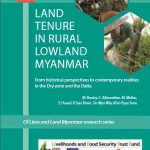
5 downloads
Title of document: Land tenure in rural lowland Myanmar: From historical perspectives to contemporary realities in the Dry zone and the Delta_EN version Authors: M. Boutry, C. Allaverdian, M. Mellac, S. Huard, U San Thein, Tin Myo Win, Khin Pyae Sone Ministry/Government Agency/Organisation: GRET Year of publication: 2017 Geographic focus: Myanmar Summary: During the critical years following the 2012 land reforms undertaken in the midst of Myanmar’s political transition, Gret conducted an in-depth study combining qualitative and quantitative surveys in nine villages of Bogale and Mawlamyinegyun townships (Delta) and nine villages in Monywa and Yinmabin townships (Dry Zone). The full report and the synthesis are the result of more than two years in-depth research and 13 months of fieldwork that involved an inter-disciplinary team of 11 international and Myanmar researchers. It provides a better understanding of land dynamics at the local level and proposes a new reading of issues faced by rural households in these days of reform Read More
9 downloads
Title of document: Better rice Initiative Asia Capacity Development for rice cultivation Authors: Henrik Beermann, Astari Widya Dharma Journal’s name if any: Ministry/Government Agency/Organisation: Deutsche Gesellschaft für Internationale Zusammenarbeit (GIZ) GmbH ; On behalf of The German Federal Ministry for Economic Cooperation and Development (BMZ) Year of publication: 2015 Geographic focus: ASIAN Main issues / topics addressed (for example: Capacity building strategy, technical processes of developing the CD strategies for sustainable rice cultivation,……) School of agroecology (if any): Web address to original document (if any): Summary: The German Food Partnership (GFP) aims at fostering the cooperation between private and public sector institutions. Its objective is to promote sustainable growth in agricultural production and improved access to nutrition within the food sector in emerging and developing countries. Public and private actors join forces in order to implement comprehensive projects and programs for sustainable business in these countries. The contribution towards food and nutrition security as well as economic development in rural areas is to be measured by increased agricultural productivity and income, improved availability of nutritious food, and food self-sufficiency. As one of the first concrete initiatives under the GFP umbrella, the Better Rice Initiative Asia (BRIA) is a joint project planned and implemented by private partners in collaboration with GIZ, and public organizations in the respective countries. BRIA aims at improving rice value chains (which include rice based nutrition components) in Southeast Asia (SEA), namely the four SEA countries Indonesia, the Philippines, Thailand, and Vietnam. BRIA’s focus is on strengthening the nutritional and economic situation of rice smallholders, and consumers. The purpose of this document is to provide an overview of the workshop and summarize the main lessons learned and recommendations for good practices of capacity development for sustainable rice cultivation in SEA. Read More
5 downloads
Title of document: Dynamics of Soil Carbon, Nitrogen and Soil Respiration in Famer’s Field with Conservation Agriculture, Siem Reap, Cambodia Authors: Don Immanuel A. Edralin, Gilbert C. Sigua and Manuel R. Reyes Journal’s name if any: International Journal of Plant & Soil Science Ministry/Government Agency/Organisation: North Carolina Agricultural and Technical State University, Greensboro, NC, USA; United States Department of Agriculture, Agricultural Research Service, Coastal Plains Soil, Water, and Plant Research Center, Florence, SC, USA. Year of publication: 2016 Geographic focus: National level Main issues / topics addressed (for example: No tillage; conventional tillage; soil organic carbon; soil quality index; cover crops.…) School of agroecology (if any): Web address to original document (if any): Summary: The years of intensive tillage in many countries, including Cambodia have caused significant decline in agriculture’s natural resources that could threaten the future of agricultural production and sustainability worldwide. Long-term tillage system and site-specific crop management can affect changes in soil properties and processes, so there is a critical need for a better and comprehensive process-level understanding of differential effects of tillage systems and crop management on the direction and magnitude of changes in soil carbon storage and other soil properties. A study was conducted in farmer’s field to evaluate the effect of conservation agriculture (CA) and conventional tillage (CT) on soil carbon, nitrogen and soil respiration in three villages of Siem Reap, Cambodia. Soil organic carbon (p≤0.01), soil total nitrogen (p≤0.01) and soil respiration (p≤0.10) for at least in two villages were significantly affected by tillage management. The soil quality was improved in villages with CA compared with villages with CT by increasing soil organic carbon (10.2 to 13.3 Mg ha-1) and soil nitrogen (0.87 to 1.11 Mg ha-1) because of much higher soil moisture (15.7±8.6 to 20.0±11.9%) retained in CA and with reduced soil temperature (30.4±2.0 to 32.4±2.3°C) during the dry period. Additionally, field soil respiration was higher in CA (55.9±4.8 kg CO2-C ha-1 day-1) than in CT (36.2±13.5 kg CO2-C ha-1 day-1), which indicates more microbial activity and increased mineralization of soil organic carbon for nutrient release. The soil’s functions of supporting plant growth and sink of carbon and recycler of nutrients was likely improved in agroecosystem with CA than in system with CT. Our results have suggested that CA may have had enhanced soils’ carbon and nitrogen contents, nutrient supplying capacity and microclimate for soil microorganisms in three villages with vegetable production. Read More
5 downloads
Title of document: Agroecology: A Global Paradigm to Challenge Mainstream Industrial Agriculture Authors: Hector Valenzuela Journal’s name if any: Ministry/Government Agency/Organisation: Department of Plant and Environmental Protection Sciences, University of Hawaii at Manoa, USA Year of publication: 2016 Geographic focus: Global level Main issues / topics addressed (for example: agroecology; agrobiodiversity; biodiversity; farming systems; organic farming; ecological farming; soil management, convention agriculture meet the basic sustainability criteria…) School of agroecology (if any): Web address to original document (if any): Summary: Considerable controversy continues to exist in scientific and policy circles about how to tackle issues of global hunger, malnutrition, and rural economic decline, as well as environmental issues, such as biodiversity loss and climate change adaptation. On the one hand, powerful vested interests, with close ties to government, media, and academic institutions, propose high-input technology-based solutions, speculative and neoliberal “market-based” solutions, and export-oriented agricultural models. On the other hand, an international scientific and grassroots Food Movement has emerged, calling for a redesign of the Global Food System in support of small-scale agroecological farming systems. A call to re-evaluate our current Food Systems was made in 2008 by the International Assessment of Agricultural Knowledge, Science and Technology for Development (IAASTD). Here, using the IAASTD study as a backdrop, we review the recent literature to outline key contentious points in the controversy between the need for high-input and “techno-based” versus agroecological farming models. A critical assessment is made of proposed strategies to protect soil resources, improve nutrient and energy cycles, protect agrobiodiversity, and promote social well-being in rural communities. With an increase in the number of affluent consumers (i.e., the middle class) in the developing world, and with the continued problem of extreme and chronic poverty with other larger sectors of society, Organic Farming and Agroecology models are put forward as a sound social, scientific, and rural development strategy. Read More

 Asia & Mekong Region
Asia & Mekong Region  Cambodia
Cambodia  Laos
Laos  Myanmar
Myanmar  Other
Other  Vietnam
Vietnam